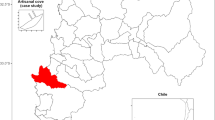Abstract
Since the 1990s, with the perfection and infiltration of Internet infrastructure and the vigorous development of a new generation of information technology industry, the contemporary sharing economy supported by big data has emerged. On the surface, sharing economy has indeed formed a brand new economic model that is different from the past. However, when we analyze the contradictory vision of supply and demand determined by the inclusion of the sharing economy in the basic social system, we can see that the essence of the contemporary sharing economy is from two dimensions influence rather than change the development mode of this contradictory paradigm: one is the anarchy state of social production is improved through communication of big data based on the Internet; the other is the reduced demand for workers having ability to pay is alleviated through collaborative consumption. Therefore, the sharing economy as a commercial operation mode still can not escape the contradiction between production and consumption. From the perspective of social conflict resolution, the real sharing comes from the improvement of fairness and justice and from the reformation of the sharing system. Such reformation is from the reuse of private resource to the collaborative sharing of public resource, that is, the commonweal development of sharing economy. Through the duplication dynamic evolution game theory model of sharing economy, it can be found that the degree of public benefit of sharing economy depends on the degree of benefit of imitation object and the number of imitators. How countries can promote the development direction of sharing economy towards public sphere and public welfare through conscious policy guidance will be an important indicator for testing the government’s ability to respond to emerging policy issues.









Similar content being viewed by others
Change history
05 December 2022
This article has been retracted. Please see the Retraction Notice for more detail: https://doi.org/10.1007/s10586-022-03862-2
Notes
Li Shuyun. On the Laborer’s Involvement in the Distribution of Surplus Value [J]. Journal of Hebei University of Economics and Business, April 2002.
References
Xiong, Z.: Thinking about the American occupation of wall street. The Freind of Leaders (2011)
Fang, T.: Implications of profit sharing theory to China. People’s Tribune, (2013)
Hu, J.: On the contemporary significance of Marx’s Wage theory. J. Econ. Shanghai Sch. March 31 (2010)
Sharing Economy Development Report Group.: Report on China’s sharing economy development: current situation, problems and challenges, development trends. Electron. Gov. (2016)
Liu, M., Yang, C.: Sino-US comparison of the basis and Background of sharing economy. China Ind. Rev. (2017)
Chen, H.: Study on the change trend of China’s labor income share. Econ. Trade Pract. (2017)
Wang, X.: Wealth Gap in the United States has Reached a Peak for 30 Years. Red Flag Manuscript, (2015)
Yao, G.: An interpretation of the trend of inequality in China’s income based on the Kuznets Curve. Hum. Resour. (2016)
Li, S.: On the laborer’s involvement in the distribution of surplus value. J. Hebei Univ. Econ. Bus. (2002)
Author information
Authors and Affiliations
Corresponding author
Ethics declarations
Funding
This paper is funded by staged research results of 2017 Shandong Social Sciences Planning Fund Project Finance Project “Research on Sustainable Development of Precision Poverty Alleviation in Shandong Province from the Perspective of Finance Sharing” (17CJRJ09), Postdoctoral Research Center Station, School of Economics of Shandong University.
Additional information
This article has been retracted. Please see the retraction notice for more detail:https://doi.org/10.1007/s10586-022-03862-2
Rights and permissions
Springer Nature or its licensor (e.g. a society or other partner) holds exclusive rights to this article under a publishing agreement with the author(s) or other rightsholder(s); author self-archiving of the accepted manuscript version of this article is solely governed by the terms of such publishing agreement and applicable law.
About this article
Cite this article
Wei, L., Yang, Y. RETRACTED ARTICLE: Development trend of sharing economy in big data era based on duplication dynamic evolution game theory. Cluster Comput 22 (Suppl 5), 13011–13019 (2019). https://doi.org/10.1007/s10586-018-1832-9
Received:
Revised:
Accepted:
Published:
Issue Date:
DOI: https://doi.org/10.1007/s10586-018-1832-9




